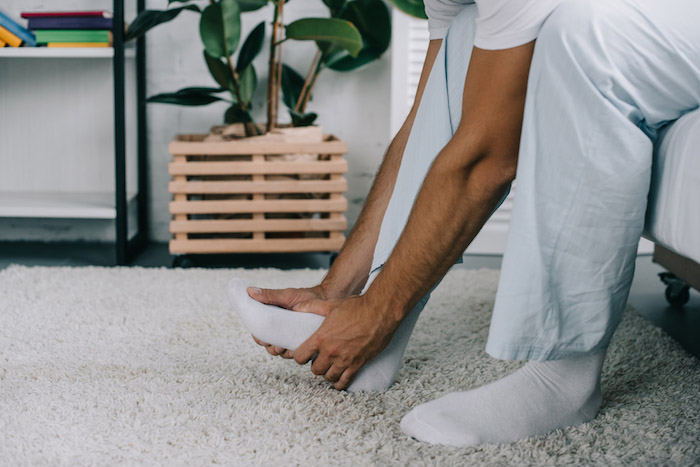7 Tips to Lower Uric Acid

21 Ways to Reduce Your Cancer Risk
Learn about evidence-based strategies to lower your risk of cancer
Understand the role of nutrition, sleep, and exercise in cancer prevention
Discover the dietary and lifestyle changes that make a difference
Recognize and avoid common cancer risk factors
Get practical tips on incorporating cancer-fighting foods into your daily life

21 Ways to Reduce Your Cancer Risk
Learn about evidence-based strategies to lower your risk of cancer
Understand the role of nutrition, sleep, and exercise in cancer prevention
Discover the dietary and lifestyle changes that make a difference
Recognize and avoid common cancer risk factors
Get practical tips on incorporating cancer-fighting foods into your daily life

21 Ways to Reduce Your Cancer Risk
Learn about evidence-based strategies to lower your risk of cancer
Understand the role of nutrition, sleep, and exercise in cancer prevention
Discover the dietary and lifestyle changes that make a difference
Recognize and avoid common cancer risk factors
Get practical tips on incorporating cancer-fighting foods into your daily life

21 Ways to Reduce Your Cancer Risk
Learn about evidence-based strategies to lower your risk of cancer
Understand the role of nutrition, sleep, and exercise in cancer prevention
Discover the dietary and lifestyle changes that make a difference
Recognize and avoid common cancer risk factors
Get practical tips on incorporating cancer-fighting foods into your daily life

21 Ways to Reduce Your Cancer Risk
Learn about evidence-based strategies to lower your risk of cancer
Understand the role of nutrition, sleep, and exercise in cancer prevention
Discover the dietary and lifestyle changes that make a difference
Recognize and avoid common cancer risk factors
Get practical tips on incorporating cancer-fighting foods into your daily life

21 Ways to Reduce Your Cancer Risk
Learn about evidence-based strategies to lower your risk of cancer
Understand the role of nutrition, sleep, and exercise in cancer prevention
Discover the dietary and lifestyle changes that make a difference
Recognize and avoid common cancer risk factors
Get practical tips on incorporating cancer-fighting foods into your daily life

21 Ways to Reduce Your Cancer Risk
Learn about evidence-based strategies to lower your risk of cancer
Understand the role of nutrition, sleep, and exercise in cancer prevention
Discover the dietary and lifestyle changes that make a difference
Recognize and avoid common cancer risk factors
Get practical tips on incorporating cancer-fighting foods into your daily life

21 Ways to Reduce Your Cancer Risk
Learn about evidence-based strategies to lower your risk of cancer
Understand the role of nutrition, sleep, and exercise in cancer prevention
Discover the dietary and lifestyle changes that make a difference
Recognize and avoid common cancer risk factors
Get practical tips on incorporating cancer-fighting foods into your daily life

21 Ways to Reduce Your Cancer Risk
Learn about evidence-based strategies to lower your risk of cancer
Understand the role of nutrition, sleep, and exercise in cancer prevention
Discover the dietary and lifestyle changes that make a difference
Recognize and avoid common cancer risk factors
Get practical tips on incorporating cancer-fighting foods into your daily life

21 Ways to Reduce Your Cancer Risk
Learn about evidence-based strategies to lower your risk of cancer
Understand the role of nutrition, sleep, and exercise in cancer prevention
Discover the dietary and lifestyle changes that make a difference
Recognize and avoid common cancer risk factors
Get practical tips on incorporating cancer-fighting foods into your daily life

21 Ways to Reduce Your Cancer Risk
Learn about evidence-based strategies to lower your risk of cancer
Understand the role of nutrition, sleep, and exercise in cancer prevention
Discover the dietary and lifestyle changes that make a difference
Recognize and avoid common cancer risk factors
Get practical tips on incorporating cancer-fighting foods into your daily life

21 Ways to Reduce Your Cancer Risk
Learn about evidence-based strategies to lower your risk of cancer
Understand the role of nutrition, sleep, and exercise in cancer prevention
Discover the dietary and lifestyle changes that make a difference
Recognize and avoid common cancer risk factors
Get practical tips on incorporating cancer-fighting foods into your daily life

21 Ways to Reduce Your Cancer Risk
Learn about evidence-based strategies to lower your risk of cancer
Understand the role of nutrition, sleep, and exercise in cancer prevention
Discover the dietary and lifestyle changes that make a difference
Recognize and avoid common cancer risk factors
Get practical tips on incorporating cancer-fighting foods into your daily life

Beginner’s Guide to Healthy Keto & Intermittent Fasting
Receive a step-by-step guide to starting Healthy Keto® and intermittent fasting
Learn about foundational principles and best practices for beginners
Get detailed visual guidance on portion sizes and meal composition
Discover how to set achievable goals and monitor your progress
Find practical tips for overcoming common challenges and staying motivated

Beginner’s Guide to Healthy Keto & Intermittent Fasting
Receive a step-by-step guide to starting Healthy Keto® and intermittent fasting
Learn about foundational principles and best practices for beginners
Get detailed visual guidance on portion sizes and meal composition
Discover how to set achievable goals and monitor your progress
Find practical tips for overcoming common challenges and staying motivated

Beginner’s Guide to Healthy Keto & Intermittent Fasting
Receive a step-by-step guide to starting Healthy Keto® and intermittent fasting
Learn about foundational principles and best practices for beginners
Get detailed visual guidance on portion sizes and meal composition
Discover how to set achievable goals and monitor your progress
Find practical tips for overcoming common challenges and staying motivated

Beginner’s Guide to Healthy Keto & Intermittent Fasting
Receive a step-by-step guide to starting Healthy Keto® and intermittent fasting
Learn about foundational principles and best practices for beginners
Get detailed visual guidance on portion sizes and meal composition
Discover how to set achievable goals and monitor your progress
Find practical tips for overcoming common challenges and staying motivated

Beginner’s Guide to Healthy Keto & Intermittent Fasting
Receive a step-by-step guide to starting Healthy Keto® and intermittent fasting
Learn about foundational principles and best practices for beginners
Get detailed visual guidance on portion sizes and meal composition
Discover how to set achievable goals and monitor your progress
Find practical tips for overcoming common challenges and staying motivated

Beginner’s Guide to Healthy Keto & Intermittent Fasting
Receive a step-by-step guide to starting Healthy Keto® and intermittent fasting
Learn about foundational principles and best practices for beginners
Get detailed visual guidance on portion sizes and meal composition
Discover how to set achievable goals and monitor your progress
Find practical tips for overcoming common challenges and staying motivated

Beginner’s Guide to Healthy Keto & Intermittent Fasting
Receive a step-by-step guide to starting Healthy Keto® and intermittent fasting
Learn about foundational principles and best practices for beginners
Get detailed visual guidance on portion sizes and meal composition
Discover how to set achievable goals and monitor your progress
Find practical tips for overcoming common challenges and staying motivated

Beginner’s Guide to Healthy Keto & Intermittent Fasting
Receive a step-by-step guide to starting Healthy Keto® and intermittent fasting
Learn about foundational principles and best practices for beginners
Get detailed visual guidance on portion sizes and meal composition
Discover how to set achievable goals and monitor your progress
Find practical tips for overcoming common challenges and staying motivated

Beginner’s Guide to Healthy Keto & Intermittent Fasting
Receive a step-by-step guide to starting Healthy Keto® and intermittent fasting
Learn about foundational principles and best practices for beginners
Get detailed visual guidance on portion sizes and meal composition
Discover how to set achievable goals and monitor your progress
Find practical tips for overcoming common challenges and staying motivated

Beginner’s Guide to Healthy Keto & Intermittent Fasting
Receive a step-by-step guide to starting Healthy Keto® and intermittent fasting
Learn about foundational principles and best practices for beginners
Get detailed visual guidance on portion sizes and meal composition
Discover how to set achievable goals and monitor your progress
Find practical tips for overcoming common challenges and staying motivated

Beginner’s Guide to Healthy Keto & Intermittent Fasting
Receive a step-by-step guide to starting Healthy Keto® and intermittent fasting
Learn about foundational principles and best practices for beginners
Get detailed visual guidance on portion sizes and meal composition
Discover how to set achievable goals and monitor your progress
Find practical tips for overcoming common challenges and staying motivated

Beginner’s Guide to Healthy Keto & Intermittent Fasting
Receive a step-by-step guide to starting Healthy Keto® and intermittent fasting
Learn about foundational principles and best practices for beginners
Get detailed visual guidance on portion sizes and meal composition
Discover how to set achievable goals and monitor your progress
Find practical tips for overcoming common challenges and staying motivated
If you have high levels of uric acid in your blood, you're probably experiencing some pretty painful symptoms—may be even gout. You may be reading this in search of much-needed relief that you haven't been able to find. It's time to do something about it, and I can help. It's time to follow my tips on how to lower uric acid.
In this article:

Uric Acid: What is it and What Causes It?
Uric acid is a byproduct of proteins, and it can leak into the joints causing a lot of pain or can lead to conditions like gout or kidney stones.
Let's break this down a little further.
Uric acid is produced during the digestion process when the body breaks down purines. Purines are nitrogen-containing compounds that are made inside your cells or come from foods that contain purines—like meat and foods with high fructose corn syrup. Excess purines can cause increased levels of uric acid.
If your body's natural process is working properly, most uric acid will dissolve in the blood. Then, it will pass through the kidneys and leave the body through your urine.
But, if too much uric acid stays in the body, this can cause excruciating arthritis-like symptoms, especially in the big toe, and in the lower part of the feet. If nothing is done to lower the uric acid levels, you may develop a condition called hyperuricemia. Hyperuricemia can then lead to serious and painful conditions like gout or kidney stones.
Gout is a form of arthritis caused by high uric acid levels. Gout is known to be a very painful condition that typically affects the joint in the base of the big toe.
Hyperuricemia occurs when uric acid left in the blood begins to cause crystals called urate to form. These crystals can then start to settle in the joints, which leads to gout, or in the kidneys, which will form kidney stones.
There are a few different things that can cause high levels of uric acid in the blood. Most of them have to do with your diet.
Here are a few of the main causes of high uric acid levels:
High-fructose corn syrup
Sugar
Kidney Dysfunction
Fasting
Ketosis
Diuretics
Excessive Meat Consumption

My Tips to Lower Uric Acid
Here are a few of the main causes of high uric acid levels, and a few of my tips on what to do about it.
1.) High Fructose Corn Syrup
This is one of the main things, I believe, that causes these high uric acid levels. You'll find high fructose corn syrup in sodas and junk food. Of course, I'm sure you don't consume soft drinks or junk food, but just in case you know someone who does.
Tip:
Try to stay away from processed and refined foods. Most of the foods you buy shouldn't even need a label (meats and veggies). But, if you buy a food product that does have a label, be sure to check it for high fructose corn syrup. If the product does have it, put it down and back away slowly. Try to choose whole foods instead.
2.) Sugar
We all know what sugar is. What you might not realize is that it's hiding out in more of your foods than you may think. It seems hard to get away from added sugar. Even your fresh fruit juices may be concentrated with fructose and glucose-containing sugar.
Tip:
Of course, stay away from the obvious sugary foods and drinks. But, just like with high fructose corn syrup, check your labels for added sugars that might be hiding out. Again, choosing whole foods over refined packaged foods will help make this easier.
3.) Kidney Dysfunction
We already talked about how uric acid levels, if high enough, can cause kidney stones. But, your uric acid levels also affect other areas of your kidney function, and surprisingly—vice-versa. Meaning, your kidney function can affect your uric acid levels. Problems with kidney function can make it challenging to lower uric acid levels and maintain healthy uric acid levels.
Tip:
Stay away from purine-rich foods and drinks, which cause uric acid levels to be high. Some of these foods and drinks are organ meats, sugary foods, processed foods, grains, coffee, and soft drinks. Instead, choose whole foods to reduce uric acid like vegetables and cherries.
This is in no way a treatment for kidney dysfunction. This is only to help support healthy uric acid levels. If you think you may be experiencing a form of kidney dysfunction, you should speak with your doctor right away.
4.) Fasting
Fasting is an incredible tool for boosting your health and maintaining a healthy body. But, for some people, fasting can cause retention of uric acid. This won't typically lead to gout, but it still can increase your uric acid levels.
Tip:
Try adding more lemon juice to your diet. Lemon juice can actually help counter uric acid and help flush things out. You could also try supplementing potassium citrate. We will talk more about this later on, but essentially it helps neutralize the uric acid build-up. This is also a symptom of fasting that may go away with time as your body becomes used to the fasting process.
5.) Ketosis
Ketosis has proven to be fantastic for many different people in many different health situations. When trying to achieve ketosis, you're switching from running on glucose to running on fat.
During this time, your Ph is going to start becoming acidic, and you will start getting rid of uric acid crystals. Essentially, what you need is a lot of vegetables to flush all of that out.
Also, if you're an individual who is prone to having high uric acid in the blood, gout, or even kidney stones, ketosis may aggravate your situation.
Tip:
It's crucial to realize that this is typically only a symptom of ketosis as you're becoming keto-adapted—just like other symptoms of keto-adaptation like the keto flu. Usually, this isn't a problem for most people during this time, but if it is, it will likely go away as you become keto-adapted. It also won't usually lead to gout if you don't already have problems with gout.
Another thing that I really need to point out is that if you try to do a ketosis diet without vegetables, you may end up having problems with gout or kidney stones. So, be sure to eat plenty of vegetables and also add lemon juice or potassium citrate to your keto diet.
6.) Diuretics
Diuretics are designed to increase the amount of water and salt expelled in the urine. Diuretics can be used for various conditions, but are often prescribed to help treat high blood pressure.
This can be a very necessary medication, and you should never change your medication regimen unless your doctor gives you the ok. However, some medications like diuretics can cause uric acid to build up in the blood.
Tip:
If you need to take a diuretic and you're experiencing symptoms that make you believe you may have high uric acid levels in your blood, talk to your doctor about it. Your doctor will be able to work with you to find the best alternative for your situation.
7.) Excessive Meat Consumption
If you're experiencing painful arthritis or gout symptoms that are associated with high levels of uric acid, you may be consuming too much meat. Some types of meat are rich in purines. Consuming too much meat will cause you to consume too many purines and will increase your uric acid levels.
Tip:
Decrease the amount of animal proteins you're eating and again, eat more vegetables. Also, be sure to stay away from organ meats like liver, which will especially aggravate conditions like hyperuricemia or gout.

The Ultimate Remedy
You've probably noticed that in a lot of my tips, I mention consuming more vegetables or potassium citrate. That's because the real key to helping reduce uric acid is— potassium citrate.
If you begin taking advantage of potassium citrate, you could start to knock out this uric acid. You should start noticing a difference after taking potassium citrate as it actually neutralizes your uric acid levels.
You can consume more potassium citrate through supplements or by eating more vegetables. Ultimately, what you really need to do is focus on the above causes, clean up your diet, don't stop ketosis or fasting, and add more potassium citrate.
Go ahead and give this a try.
Up Next:
Previous blog
Estrogen and Your ProstateNext blog
The Best Vitamin K2 FoodsTags

Popular
08/21/2024
55K views
02/23/2025
46.3K views
11/18/2024
277.5K views
03/18/2024
11/21/2022




